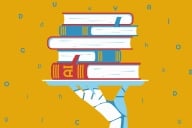You have /5 articles left.
Sign up for a free account or log in.

The Association of Research Libraries announced a set of seven guiding principles for university librarians to follow in light of rising generative AI use.
Getty Images
A research library association has issued new AI guidelines to help librarians deal with an onslaught of inquiries related to generative artificial intelligence.
In the two years since the debut of ChatGPT, librarians have often been tapped to head up research and development of emerging AI technology, fielding questions on copyright and citation concerns. Librarians at some institutions have made their own AI guides or launched pilot projects to address academic anxieties.
The seven guiding principles from the Association of Research Libraries (ARL) focus on the development and deployment of generative AI, which usually refers to large language models such as OpenAI’s ChatGPT. The association said the principles aim to “promote ethical and transparent practices, and build trust among stakeholders, within research libraries as well as across the research environment.”
The guidelines issued on April 25 also will help the ARL advocate for policy changes.
At the start of 2024, more than three quarters of librarians said in a poll that there is an urgent need to address AI’s ethical and privacy concerns. Major worries included violations of privacy and misuse of data, such as generating false citations.
The new guidelines could serve as a reference point for addressing those concerns, according to Cynthia Hudson Vitale, ARL’s director of science policy and scholarship.
“Many of our members have been approached to be partners on campus and support institutions in their needs for creating policies around academic integrity, research integrity and research around AI,” she said. “The principles are meant to set a baseline of what libraries can also provide the users within their communities in which we live and work in.”
The seven principles are:
- Foster digital literacy: Educate library users and IT professionals about AI.
- Understand and raise awareness of AI bias: Content generated by artificial intelligence is vulnerable to distortion of information and images, and libraries are encouraged to help users navigate and assess AI with distortion in mind.
- Advocate for openness and transparency: Specifically, focus on the algorithms, training data and methodologies used to create AI.
- Understand there’s no AI without humans: Recognize human involvement is needed in ethical, accessibility and reliability considerations when it comes to using AI in research environments.
- Security and privacy are key: Libraries are encouraged to advocate for laws and regulations that prioritize personal information of library users.
- Continuation of copyright law enforcement: There is a push for libraries to “preserve library rights” for research and education purposes. The principle also points toward a separate set of copyright principles and its intersection with AI, created by the Library Copyright Alliance, which is the Association of Research Libraries and the American Library Association.
- Equity in digital information: The copyright law needs to remain the guiding force of contracts with academic and research journals and institutions, according to Katherine Klosek, director of information policy and federal relations. She stated there have been some concerns on contracts with private companies overriding copyright laws. This principle emphasizes the need for fair use, intellectual freedom and freedom of information regarding the use, and access to, digital information.
Klosek and Hudson Vitale said while there is no set plan to review the principles and potentially change them, they are open to discussion as AI and related concerns evolve.
Discussion of the principles began over a year ago, roughly six months after the debut of ChatGPT. The guidelines were developed through both the ARL Scholars and Scholarship Committee, and the ARL Advocacy and Public Policy Committee. They were refined after multiple committee meetings, along with a member-wide session and an open comment period for all members.
“Librarians have always been in the business of teaching how to evaluate information, whether it’s written information or sources of information, so that hasn’t changed since the internet began,” said Jeanette Moss, an instruction and curriculum support librarian at Northwestern University. “But now we have to double down on that point even more.”









